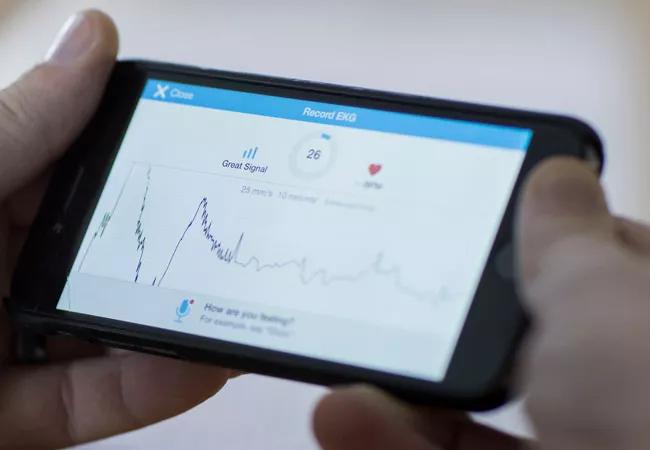Review offers comprehensive assessment of the landscape for wearables and more

“With great power and far-reaching capabilities come great responsibilities.” So concludes a new review paper, “Digital Health and the Care of the Arrhythmia Patient: What Every Electrophysiologist Needs to Know,” published in Circulation: Arrhythmia and Electrophysiology by a multi-institutional team of authors led by Khaldoun Tarakji, MD, MPH, Associate Section Head of Cardiac Electrophysiology at Cleveland Clinic and Director of the Center for Digital Health and Telemedicine in its Heart, Vascular & Thoracic Institute.
Advertisement
Cleveland Clinic is a non-profit academic medical center. Advertising on our site helps support our mission. We do not endorse non-Cleveland Clinic products or services. Policy
Dr. Tarakji assembled the group of specialists to develop the review, which includes national leaders in digital health, electrophysiology, patient experience and other disciplines. The authors present a briskly paced survey of leading issues around digital health in electrophysiology and cardiovascular care overall, specifically:
While the review addresses the transformation of care for arrhythmia patients with the advent of digital technologies, it notes that the challenges and opportunities explored apply to all medical specialties. As a result, the document represents a resource for describing the digital health landscape to clinicians of all disciplines as well as to patients, researchers and members of industry.
Here is a sampling of observations made in the article:
Advertisement
These and other observations give rise to the authors’ conclusion that these technologies’ formidable capabilities come with matching demands and responsibilities. “As the supply of patient-generated data and genomic data swells,” says Dr. Tarakji, “clinicians have an opportunity to develop more-personalized risk assessments to better manage common and high-burden diseases. This review helps guide the cardiovascular community on the issues to be considered as we work to make the growing abundance of data an asset rather than a burden.”
“Once fully employed and integrated, digital health — whether through wearables or delivery of care — will truly transform healthcare as we know it,” observes Oussama Wazni, MD, Section Head of Cardiac Electrophysiology at Cleveland Clinic. “This comprehensive review will help clinicians navigate the future of digital healthcare.”
The review is available here.
Advertisement
Advertisement

How Cleveland Clinic is using and testing TMVR systems and approaches

NIH-funded comparative trial will complete enrollment soon

How Cleveland Clinic is helping shape the evolution of M-TEER for secondary and primary MR

Optimal management requires an experienced center

Safety and efficacy are comparable to open repair across 2,600+ cases at Cleveland Clinic

Why and how Cleveland Clinic achieves repair in 99% of patients

Multimodal evaluations reveal more anatomic details to inform treatment

Insights on ex vivo lung perfusion, dual-organ transplant, cardiac comorbidities and more